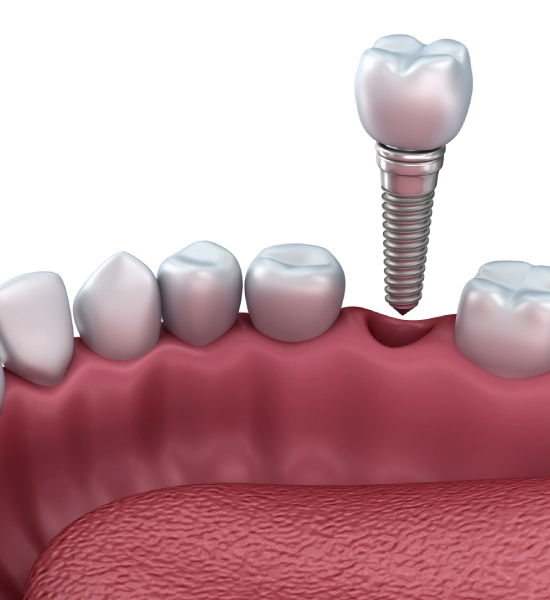Is implant bad for health? This question often sparks concern and curiosity among people considering dental implants as a solution for missing teeth or other dental issues. With the increasing popularity of dental implants, there is a growing interest in understanding their potential impact on overall health and well-being.
In this blog, we will delve into the topic of dental implants and their implications for your health. Whether you’re considering dental implants or simply curious about their safety, this blog will address the questions and empower you to make informed decisions about your dental care.
What are Dental Implants?
These are artificial tooth roots made up of titanium or other biocompatible materials. They are surgically implanted into the jawbone to give a stable foundation for replacement teeth or dental prosthetics.

After placement, dental implants integrate with the nearby bone via osseointegration, forming a sturdy foundation for artificial teeth. Unlike traditional dentures or bridges, dental implants provide a long-lasting solution for missing teeth and can significantly improve oral function and aesthetics.
Common Concerns About Dental Implants
Despite their benefits, some individuals may be concerned about dental implants’ safety and potential risks. These concerns often revolve around the following factors:
Biocompatibility:
Since dental implants are made of metal, there may be concerns about their compatibility with the body and the risk of allergic reactions or immune responses.
Infection:
The surgical placement of dental implants carries a risk of infection, which potentially causes peri-implantitis or implant failure.
Long-Term Health Effects:
Some people worry about the long-term effects of having foreign materials implanted in their bodies and whether dental implants could contribute to systemic health issues.
Risks Associated With Dental Implants
Although dental implants are generally successful, like any surgical procedure, there are potential risks to acknowledge. While these risks are rare, it’s essential to understand them before undergoing implant surgery.
Infection
One of the risks of dental implants is the possibility of developing an infection at the implant site. Signs of a gum infection may include persistent bad breath, swollen gums, loose teeth, new gaps between teeth, or the presence of pus. If you notice any of these symptoms, it’s crucial to contact your dentist promptly for evaluation and treatment.
Nerve Damage
There is a small risk of nerve damage associated with dental implants, which may affect the nerves in your face and gums. This damage could extend to surrounding structures such as other teeth or blood vessels. Symptoms of nerve damage include pain, numbness, or tingling sensations in your teeth, gums, lips, or chin.
Sinus Complications
In rare cases, dental implants inserted in the upper jaw may lead to complications involving the sinuses. The implants could impinge on the sinus cavities, resulting in sinus issues or discomfort.
Implant Rejection or Failure
Although uncommon, there is a possibility of your body rejecting a dental implant. This rejection could manifest as loosening or infection of the implant, necessitating replacement. Several factors, including peri-implantitis (inflammation around the implant), lack of osseointegration (bone integration failure), or habits like teeth grinding, may contribute to implant failure.
Peri-implantitis
Peri-implantitis, akin to gum disease but specific to dental implants, can occur due to poor oral hygiene or certain habits. Bacteria can gather around the implant, leading to inflammation, bleeding, infection, and bone loss. Maintaining good oral hygiene practices is necessary to avoid peri-implantitis and ensure the long-term success of dental implants.
Issues From Bad Habits
Some habits you may not even be aware of can contribute to the failure of your dental implants. These are known as parafunctional habits, and they occur involuntarily, meaning your body performs them automatically.
For example, you might have habits like nail-biting, teeth grinding, or nervous ticks that you do without even realizing it, which can affect the success of your dental implants.
If you suspect you have any of these habits, discussing them with your dentist is important. They can offer suggestions to improve your chances of a successful implant. This may include techniques to enhance your sleep quality or reduce stress levels. Additionally, they may recommend using a bite plate or night guard to protect your teeth from the effects of grinding.
Inadequate Bone Integration
Your dental implants may face failure if there isn’t sufficient bone surrounding them to provide adequate support. This condition is known as lack of osseointegration and can cause dental implant failure.
Several factors can contribute to bone loss around your implants. Bacterial infections like peri-implantitis can erode bone tissue, and excessive stress on the implants or teeth grinding and clenching can also lead to bone loss. Poor oral hygiene practices can exacerbate this problem.
Additionally, if you’ve undergone radiation therapy to your head or neck, it can interfere with the osseointegration process.
Before undergoing implant surgery, discuss your medical and dental history with your dentist. By understanding your potential risks, they can assist you in taking proactive measures to enhance the success of your implant.
Although initial implant failure is possible, subsequent replacements have a high success rate. Replacement implants have a 90% chance of success, providing hope for those who require additional procedures.
After Getting Dental Implants
In most cases, getting dental implants is a smooth process with few complications. If any issues arise, they’re usually minor and can be easily addressed by your dentist or periodontist. Following the procedure, your periodontist will create a personalized care plan for you. This plan will involve regular follow-up appointments to check the health of your implants, teeth, and gums.
If you experience problems after getting implants, such as difficulty chewing, mouth pain, or signs of infection, it’s important to contact your dentist immediately. They can provide the necessary treatment to address your problem and ensure the success of your implants.
Conclusion
Dental implants are generally considered safe for most people. However, individuals who have allergies to titanium can explore alternative options such as zirconia implants. Your dentist and oral surgeon will evaluate your situation to check if dental implants are a suitable choice for you.
Ready to address your dental concerns? Schedule an appointment with All About Smiles in Roseville, MI, and let our experienced team assess your dental health. New patients can call at (586) 200-4187, while existing patients can reach us at (586) 775-3312. Don’t delay – book your appointment today!
FAQ
While dental implants carry some risks, they are safe for most individuals. However, it’s important to consult with your dentist to assess your specific situation.
There is a small risk of infection associated with dental implants, but proper oral hygiene and regular dental check-ups can help minimize this risk.
If you experience any issues such as pain, swelling, or difficulty chewing after getting dental implants, it’s important to contact your dentist immediately for evaluation and treatment.







